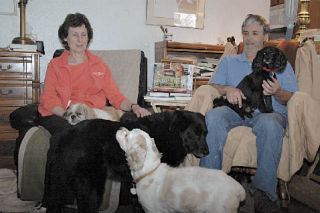MARYSVILLE — Lee and Judith Piper both have a few stories to tell.
In fact, they seem to have, in their heads, the known history of each of their dozen or so canine charges, as well as plenty of anecdotes on the hundred of dogs they have helped place in homes around the area.
For example, on this day, Ethel, a lab mix, is lounging on a stuffed dog bed, looking perfectly comfortable and about to doze off. Judith said when Ethel first arrived at Old Dog Haven, she had no hair on most of her back and none on her tail. She’d been left in a shelter and wasn’t adopting very well.
“I got a call saying, ‘You’ve got to come get this dog,’” Judith said. “She wouldn’t eat … They said she’s given up and was waiting to die.”
A sort of clearinghouse for older dogs, shelters normally are the source for about half of the animals Old Dog Haven currently has placed in foster homes or “Last Refuge Homes” around northwestern Washington. The rest of the animals touched by Old Dog Haven simply found themselves abandoned or could no longer be cared for by their owners.
Not incidentally, an official 501c charity, the Pipers operate Old Dog Haven out of their home on 99th Avenue NE just outside Marysville in unincorporated Snohomish County.
With Judith acting as the executive director of the charity, the Pipers take in older dogs, working to place them in foster homes or in places where they can live out the time they have left in comfort, those so-called “Last Refuge Homes.” The dozen or so dogs kept at the Piper home are animals the couple feels cannot be fostered out because of health or behavioral problems. Several of the Pipers’ dogs are blind or deaf.
“I’m usually the only one that will take blind dogs,” Judith said.
“That’s OK,” chimes in Lee. “We’re animal people. There’s five cats in here too.”
Old Dog Haven was launched in 2000 when Judith first took in an older dog.
“We kind of looked at it and said somebody’s got to do this,” Judith said. “The adoption part it was something we never even thought of.”
The current year has been somewhat different in the operation of Old Dog Haven because of what Judith called overcrowding at local shelters. Because of that situation, dogs rescued from shelters make up the vast majority of the 137 animals Old Dog Haven has had on its roster so far this year.
“For older dogs, shelters are just terrifying,” Judith said, adding the dogs find themselves ripped away from the owners and surroundings they may have known for most of their lives.
Because of the number of animals coming from shelters recently, Judith said she has had to turn away private owners looking for help with aging dogs.
“I stay up at night crying sometimes,” Judith said flatly in regards to the dogs she has been unable to aid.
Most Old Dog Haven animals have some sort of health problems ranging from the minor, such as dental problems, to far more serious issues, such as tumors. Besides shelters, many of the dogs taken in belonged to senior citizens who find they can no longer keep the dogs. Other owners decide they can’t or don’t want to care for an aging animal with often expensive health problems.
“Our biggest need is for foster homes,” Lee said.
The Pipers are careful about where they send their dogs, requiring potential foster families to fill out a detailed questionnaire covering topics such as how long the animal will be left home alone during the day, whether there are children in the house and so on.
“Some older dogs just can’t handle a lot of stairs,” Judith noted.
Getting health problems under control is the first order of business when an animal arrives at Old Dog Haven and vet bills represent a high percentage of the Lee’s expenses, running as high as $19,000 a month. When a dog is adopted, Old Dog Haven often continues to fund medical care.
Operating entirely on donations, Old Dog Haven has an annual budget of about $270,000. Both Lee and Judith said they have a good core group of donors, including a few corporate sponsors.
But they also rely and seem to talk a lot more about smaller donors, like the senior citizens who regularly send in $5 a month.
“People have been pretty loyal to us,” Lee said.
As far as they can tell, Old Dog Haven is one of only two charities focusing on the needs of older dogs. The other is in Cleveland, Ohio. Judith added the Pipers regularly receive requests to take dogs from as far away as Florida, but she emphasizes Old Dog Haven only serves northwestern Washington.
“Having an older dog doesn’t mean you have an inactive dog,” Lee said. “A lot of times it’s just the opposite.”
“They’re wonderful dogs,” Judith added. “This is the best time of their lives. They’re terrific companions and they don’t ask a lot.”
For more information on Old Dog Haven, visit their Web site at www.olddoghaven.org.



